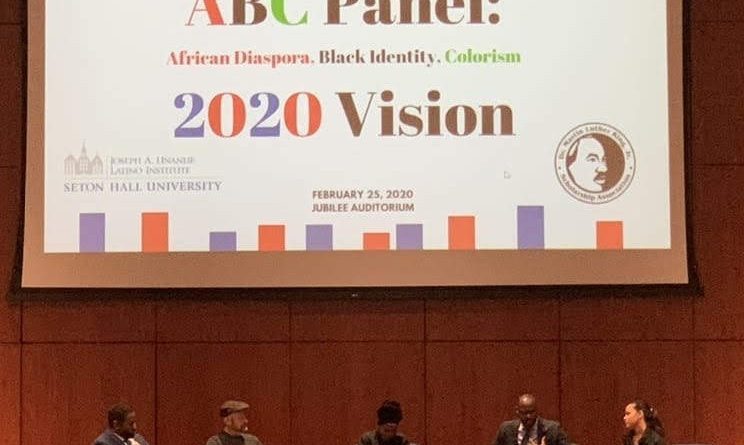Seton Hall Hosts 2nd Annual ABC Panel
Brittney Segura
Staff Writer
On February 25, the Joseph A. Latino Institute and Martin Luther King (MLK) Student Association hosted its Annual African Diaspora, Black Identity, and Colorism (ABC) Panel: 2020 Vision.
Lamda Sigma Upsilon Latino Fraternity Inc, Adelante, Haitian Organization Promoting Education, Council of Africana Scholars, Chi Upsilon Sigma National Latin Sorority Inc., the Muslim Student Association, and Lambda Theta Alpha Latin Sorority Inc co-sponsored the event.
There were two panels exploring political identity in the black community. Rev. Dr. Forrest Pritchett, director of Seton Hall University’s Dr. Martin Luther King Jr. Leadership Program moderated the first panel, which featured esteemed faculty members including Dr. Winston Roberts – Associate Dean of Students, Dr. W.K. Mott – Chair of the Political Science and Public Affairs, Viannca Velez – Director of Alumni Communication and Digital Engagement, Minenhle Khumalo – Professor of Interdisciplinary studies, and Detective Herv Cherilien from the Essex County Prosecutors Office.
To begin the panel, Reverend Dr. Forest Prichett introduced guest speakers and emphasized the importance of having an open dialogue about identity politics. Afterward, he asked speakers to describe their experience within American politics as well as issues of significance for each.
Detective Herv Cherilien of Essex County eloquently discussed how his upbringing caused him to experience politics in a different way. He explained he did not become politically active until after entering his career and emphasized the importance of having a mentor for at-risk youth, due to his experience of not having a male role model growing up. He states, “It was difficult for me, to become a man without a man.” He wished for at-risk youth to have the support that he did not and highlighted how voting matters as well as taking actions to change your community individually.
Dr. Mott stood out spectacularly with his words regarding his experience with politics. While Dr. Mott pointed out he is not part of the black community, he recognizes the “Christo-centric” class culture in America impacts the black community deeply. He especially showed deep concern for the black and brown LGBT+ community. He stated, “Tonight, more than 12,000 to 18,000 adolescents are homeless. 80 percent are black and brown and almost all of them are queer.” Dr. Mott stressed the significance of addressing the needs of all minorities individually and not as a whole.
Kyle Younger, Director of Professional Services moderated the second panel. This panel included Seton Hall students, including Brandon Hillard, Kimani Key, Natalia Rosario, and Diplomacy Graduate students Mark Wood and Amatullah Shaw.
Dr. Younger opened the floor to the student panelists to discuss their identities and experiences as members of the black community. Graduate student Amatullah discussed how her experience is different because, in addition to being black, she is also Muslim and has to deal with Islamophobia. When asked about any last words she wished to talk about in the panel, she said “Since being at the School of Diplomacy, I’ve grown to realize that it is like a bubble. We have students from all over the world here which contributes to the diversity that I’ve always loved. However, as an African American, I have found that people still press me further when asking where I’m from, as if me saying ‘here’ wasn’t the answer they were looking for.”
Additionally, Mark Wood, another Diplomacy graduate student, talked about his experience as an international student from Zambia. He explained how his upbringing in Africa gives him a different perspective. He pointed out because Zambian and American culture is different, he had to adapt quickly. Mark gave insights about what he learned from his experience. He noted, “Empathy… I believe this is in part what diplomacy is – understanding people or culture is important to breaking down stereotypes and prejudices. Peace and understanding can be fostered through conversations and undertaking that although we may have different views of the world, we are all human.”
The panel concluded with questions from the audience ranging from advice to attendees’ experiences as well as future steps. The panel noted that for the Seton Hall community to become more engaged with assisting these communities, it will require efforts from the community itself, not from the senior-level administration.
The event was an excellent opportunity to have a safe space to discuss these issues as a community. It illustrated that while the black community is not homogeneous, there are collective experiences that people need to share.


